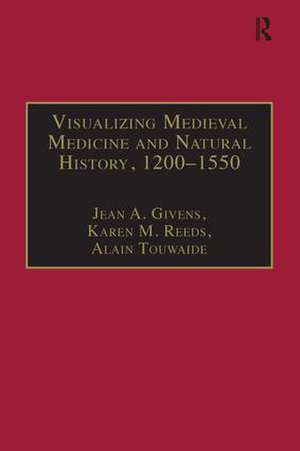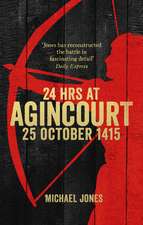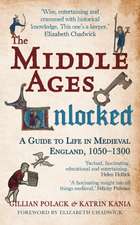Visualizing Medieval Medicine and Natural History, 1200–1550: AVISTA Studies in the History of Medieval Technology, Science and Art
Editat de Jean A. Givens, Karen M. Reeds, Alain Touwaideen Limba Engleză Paperback – 9 sep 2016
| Toate formatele și edițiile | Preț | Express |
|---|---|---|
| Paperback (1) | 488.12 lei 6-8 săpt. | |
| Taylor & Francis – 9 sep 2016 | 488.12 lei 6-8 săpt. | |
| Hardback (1) | 1064.01 lei 6-8 săpt. | |
| Taylor & Francis – 20 oct 2006 | 1064.01 lei 6-8 săpt. |
Preț: 488.12 lei
Nou
Puncte Express: 732
Preț estimativ în valută:
93.40€ • 97.53$ • 77.13£
93.40€ • 97.53$ • 77.13£
Carte tipărită la comandă
Livrare economică 15-29 aprilie
Preluare comenzi: 021 569.72.76
Specificații
ISBN-13: 9781138270831
ISBN-10: 1138270830
Pagini: 304
Dimensiuni: 156 x 234 x 17 mm
Greutate: 0.43 kg
Ediția:1
Editura: Taylor & Francis
Colecția Routledge
Seria AVISTA Studies in the History of Medieval Technology, Science and Art
Locul publicării:Oxford, United Kingdom
ISBN-10: 1138270830
Pagini: 304
Dimensiuni: 156 x 234 x 17 mm
Greutate: 0.43 kg
Ediția:1
Editura: Taylor & Francis
Colecția Routledge
Seria AVISTA Studies in the History of Medieval Technology, Science and Art
Locul publicării:Oxford, United Kingdom
Cuprins
Contents: Introduction, Jean A. Givens, Karen M. Reeds, Alain Touwaide; Image, word and medicine in the Middle Ages, Peter Murray Jones; Latin crusaders, Byzantine herbals, Alain Touwaide; The illuminated Tacuinum sanitatis manuscripts from northern Italy ca. 1380-1400: sources, patrons, and the creation of a new pictorial genre, Cathleen Hoeniger; Erudition on display: the 'scientific' illustrations in Pico della Mirandola’s manuscript of Pliny the Elder’s Natural History, Sarah Blake McHam; Reading and writing the illustrated Tractatus de herbis, 1280-1526, Jean A. Givens; Leonardo da Vinci’s anatomical studies in Milan: a re-examination of sites and sources, Monica Azzolini; (Hu)moral exemplars: type and temperament in cinquecento painting, Piers D. Britton; Leonardo da Vinci and botanical illustration: nature prints, drawings, and woodcuts ca. 1500, Karen M. Reeds; The uses of realism in early modern illustrated botany, Claudia Swan; Index.
Notă biografică
Jean A. Givens is Associate Professor in History of Art at the University of Connecticut, Storrs, Connecticut, USA. Karen M. Reeds is an independent scholar in Princeton, New Jersey, USA, affiliated with the Princeton Research Forum and the National Coalition of Independent Scholars. Alain Touwaide is Historian of Sciences at the National Museum of Natural History at the Smithsonian Institution, Washington DC, USA
Recenzii
’it is rare to come across a collected volume which sustains such consistent quality and coherent discussion within such breadth of theme. ... This is a beautiful, intriguing and thought-provoking collection of essays. Every one has been written elegantly and with clarity, an impressive feat given the complex nature of many of the manuscript transmissions discussed. The book is also generously illustrated ...The book will of course attract scholars of medieval and early modern medicine and natural history. In the broader questions raised by this collection, however, there lies significance for a much wider readership, for those interested in the history of the book as much as those concerned with the history of the image.’ Medical History ’Few volumes with contributions on topics that belong to the fields of different disciplines - here art history, natural history, and medicine - show almost consistent high quality and signs of a real intellectual exchange between the authors. That is the case here, and the credit should go especially to the three editors.’ Nuncius ’ ... a much-needed and thought-provoking collection of essays. ... a stimulating read that should inspire future research. They should interest historians of medicine and science as well as those researching medieval and Renaissance visual culture more generally. This collection reflects a much more critical attitude towards art and imagery that in time will transform understanding of medieval medicine and natural history.’ English Historical Review ’The AVISTA series was created to draw attention to medieval technology, science and art in the broadest meaning of the words, and to examine their interactions. The [volume] under review succeed in fulfilling their organisers’ aims.’ Metascience
Descriere
Visualizing Medieval Medicine and Natural History, 1200-1550 addresses fundamental questions about the interplay of visual and verbal communication in medieval medicine, pharmacy, and natural history. Analyzing images in works as diverse as herbals, jewellery, surgery manuals, lay health guides, cinquecento paintings, manuscripts of Pliny's Natural History, and Leonardo's notebooks, the essays ask: What counts as medical illustration in the Middle Ages? What purposes and audiences do these illustrations serve? How do images of natural objects, observed phenomena, and theoretical concepts amplify texts and convey complex cultural attitudes? Why do we regard some of these images as "medieval" productions while other exactly contemporary images strike us as typically "early modern" in character?




















